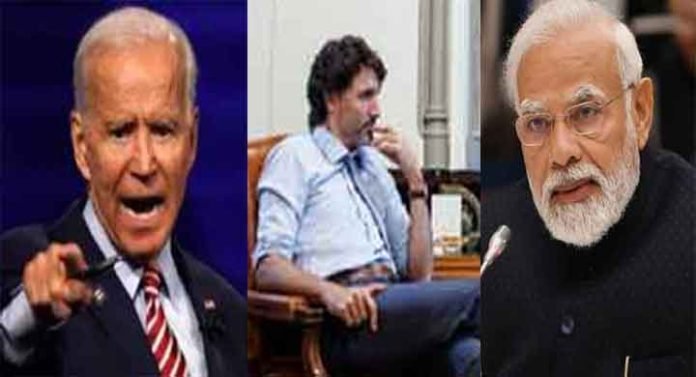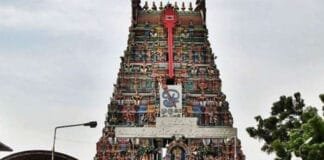INVC NEWS
New Delhi – The diplomatic conflict between India and Canada continues to escalate, showing no signs of resolution. The latest development in this ongoing dispute involves reports that India has added an official from the Canada Border Services Agency (CBSA) to its list of fugitive terrorists. The officer in question has been identified as Sandeep Singh Sidhu, who is now at the center of a controversy that may further deteriorate the already strained relations between the two nations. India has been demanding the extradition of these individuals it deems as terrorists, and the inclusion of Sidhu in this list raises concerns that tensions may rise even higher.
Nijjar’s Murder: The Catalyst of India-Canada Diplomatic Strain
The diplomatic rift between India and Canada has its roots in the murder of Khalistani terrorist Hardeep Singh Nijjar. This incident set off a series of confrontations, with both countries embroiled in a tug-of-war over accusations and counter-accusations. Nijjar’s assassination led to India recalling its diplomats from Canada and Canada expelling several Indian officials. Canadian Prime Minister Justin Trudeau, along with the Royal Canadian Mounted Police, publicly accused Indian diplomats of gathering information on Sikh separatists in Canada and sharing it with the Indian government, allegedly with the intent of targeting them.
India strongly rejected these accusations, calling them unfounded and absurd. The Indian Ministry of External Affairs expressed displeasure with these allegations and emphasized the baselessness of the claims. The diplomatic fallout from Nijjar’s death has been prolonged, and the listing of Sidhu could mark yet another turning point in this contentious relationship.
The Serious Allegations Against Sandeep Singh Sidhu
According to media reports, Sandeep Singh Sidhu is a member of the banned International Sikh Youth Federation (ISYF) and is now being implicated in terrorist activities in Punjab. Reports suggest that Sidhu has connections with Pakistan-based Khalistani terrorist Lakhbir Singh Rode and other operatives working for Pakistan’s intelligence agency, the ISI. These ties have raised alarm in India, as Sidhu has reportedly been involved in aiding and abetting terrorist operations targeting India.
Sidhu’s alleged involvement extends beyond mere associations. He is reportedly implicated in the 2020 murder of Balwinder Singh Sandhu, a Shaurya Chakra awardee. Sandhu was well-known for his efforts in combating Khalistani terrorism during Punjab’s insurgency and for vocally opposing the Khalistan Referendum, which is being spearheaded by organizations such as Sikhs for Justice (SFJ) in the U.S. and Canada.
The Canadian officer’s association with these groups has led India to demand swift action, and there is increasing pressure on Canada to address these allegations.
Balwinder Singh Sandhu’s Assassination and Sidhu’s Involvement
The murder of Balwinder Singh Sandhu was a significant blow to India’s efforts to curb terrorism within and beyond its borders. Sandhu, a decorated anti-terrorism activist, was known for his courage during the height of the Punjab insurgency. His opposition to Khalistani separatists and his resistance to the Khalistan Referendum campaign in the diaspora made him a target for extremists.
Reports allege that Sidhu played a role in orchestrating Sandhu’s assassination, in collaboration with Lakhbir Singh Rode and other Khalistani operatives. According to India’s National Investigation Agency (NIA), the plot to kill Sandhu was hatched by a man known as Sunny Toronto, believed to be Sidhu’s alias, and a group of ISI-backed terrorists. Though it remains unclear whether Sidhu and “Sunny Toronto” are the same individual, the connections between Sidhu, Rode, and the ISYF have led to his inclusion on India’s fugitive list.
This murder, and the subsequent investigation, has only intensified India’s call for justice and increased tensions with Canada, particularly given the political asylum and protections extended to individuals accused of terrorist activities by Indian authorities.
Canada’s Response and Diplomatic Impasse
Canada’s response to these escalating tensions has been cautious but assertive. Following the assassination of Nijjar and India’s accusations, Prime Minister Trudeau and his government have doubled down on their stance of protecting freedom of speech and political dissent, which has included sheltering Sikh separatists who advocate for an independent Khalistan state.
India, however, sees Canada’s leniency towards Khalistani activists as a threat to its own national security. Over the last decade, India has submitted at least 28 extradition requests for individuals accused of terrorism, all of which remain unresolved by Canadian authorities. This inaction has been a source of frustration for India, which now feels that Canada is harboring individuals directly responsible for destabilizing its internal security.
The addition of a CBSA officer to the fugitive list is a serious escalation. India’s stance is clear: anyone involved in fostering terrorism, regardless of their status or nationality, should face legal consequences. The longer these extradition requests remain unaddressed, the greater the likelihood that India-Canada relations will continue to deteriorate.
Potential Fallout of India’s Action
India’s decision to include Sandeep Singh Sidhu in its list of fugitive terrorists has the potential to worsen bilateral ties significantly. If Canada fails to address these allegations, the strain could extend beyond just diplomatic relations, potentially impacting trade, immigration policies, and international cooperation on key issues.
India and Canada share deep economic ties, with both nations benefiting from trade and investment opportunities. However, these ties have already been tested by the ongoing diplomatic conflict, and any further escalation could result in economic repercussions. Moreover, both countries are members of various international organizations, and the growing mistrust could have ripple effects on multilateral relations, especially in forums where cooperation is essential.
For India, the inclusion of Sidhu and the demand for his extradition are vital steps in addressing what it perceives as an unchecked terrorist threat. For Canada, these developments present a delicate balance between domestic political pressures from the Sikh diaspora and its international relations with India.
















